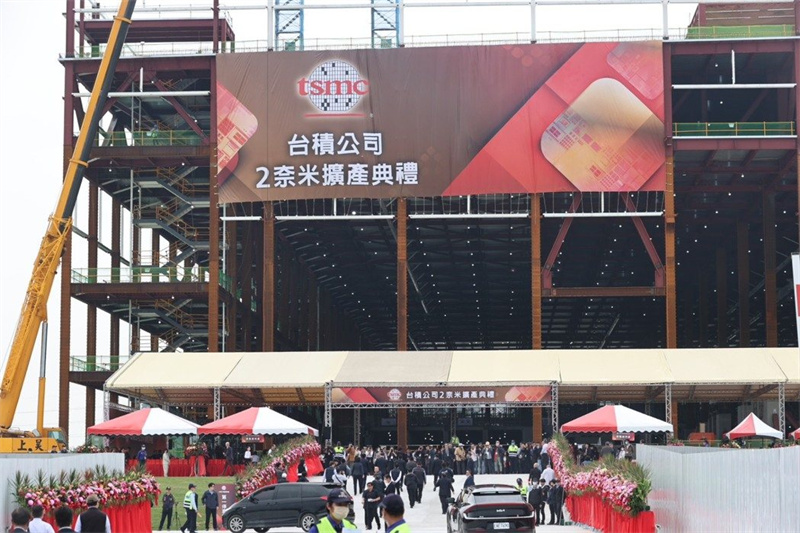March 31, Kaohsiung, Taiwan – TSMC held a 2nm expansion ceremony at its Kaohsiung Nanzih Science Park today, marking a major milestone in its advanced semiconductor manufacturing technology and reinforcing its commitment to investing in Taiwan.
2nm Mass Production Expected This Year
The event was hosted by TSMC's Co-Chief Operating Officer and Executive Vice President, Y.P. Chin, with Taiwan's Premier Cho Jung-tai and other government officials in attendance, underscoring the strategic importance of TSMC's expansion.
TSMC's first 2nm fab in Kaohsiung (P1) completed construction late last year, with equipment installation beginning in early 2024. Industry sources indicate that the Kaohsiung 2nm fab is progressing smoothly, aligning with the Hsinchu Baoshan 2nm pilot line. The 2nm trial yield at Baoshan has already surpassed early 3nm levels, enabling TSMC to advance mass production by one quarter, with both the Kaohsiung and Baoshan fabs expected to begin 2nm production in the second half of this year.
TSMC's 2nm process introduces a nanosheet transistor architecture, replacing the traditional FinFET structure, offering a 10-15% speed increase at the same power level, or a 25-30% power reduction at the same speed, with 15% higher transistor density. This breakthrough will drive next-generation AI, 5G, and high-performance computing (HPC) applications. Chairman Mark Liu has previously stated that 2nm demand is already exceeding 3nm at the same stage.

Apple, AMD, Intel Among First 2nm Customers
Due to the higher design complexity of 2nm, major customers like Apple, AMD, and Intel are already working closely with TSMC to integrate the technology into their products. Initially, Hsinchu's Baoshan fab will dedicate its 2nm capacity to Apple, while Kaohsiung will serve other customers, including Intel. Reports indicate that TSMC's 2nm production is fully booked until 2027, signaling unprecedented demand before mass production even begins.
At the ceremony, Y.P. Chin highlighted Kaohsiung's strategic importance in TSMC's expansion, revealing that each Kaohsiung fab will be twice the size of competitors' facilities, covering an area larger than 46 football fields. The initial investment of NT$1.5 trillion will create over 7,000 direct jobs and 20,000 construction jobs. The Kaohsiung campus is expected to house up to five 2nm fabs, with Fab 1 now installing equipment, Fab 2 nearing structural completion, and Fab 3's construction already underway.
With the total investment in Taiwan's 2nm capacity estimated at NT$4 trillion, the expansion is set to create thousands of high-paying jobs and strengthen Taiwan's position as a global semiconductor hub.
1.4nm Process Breakthrough & Future Expansion
In addition to the 2nm milestone, TSMC has made significant progress in its 1.4nm process. Sources reveal that TSMC has informed suppliers to prepare 1.4nm equipment, with a pilot production line (Mini-line) to be installed this year at Hsinchu Baoshan's second advanced fab.
TSMC has also adjusted its Baoshan Fab 20 expansion plan, converting two of its four planned 2nm fabs (P3 & P4) into 1.4nm production sites. Similarly, in Taichung's Central Taiwan Science Park (CTSP), the newly designated Fab 25 will house four 1.4nm fabs, with the first (P1) targeting risk trial production by 2027 and mass production in 2028.
However, land acquisition delays due to disputes at the CTSP Phase 2 expansion site could push Baoshan's 1.4nm mass production ahead of Fab 25, making Baoshan the world's first production site for TSMC's most advanced 1.4nm process.
TSMC's long-term investment strategy remains ambitious, with plans for 11 new fabs, including Baoshan's four fabs, Kaohsiung's five fabs, and two advanced packaging facilities in Chiayi. Looking further ahead, six more advanced fabs in Taiwan's Shalun Smart Green Energy Science City are under consideration.
With an estimated $300 billion total investment in Taiwan, compared to an uncertain $100 billion U.S. investment timeline, TSMC's focus remains firmly on Taiwan. Suppliers such as ASML, Applied Materials, Tokyo Electron, Merck, and Zeiss continue expanding their operations in Taiwan, despite geopolitical uncertainties, underscoring Taiwan's central role in the global semiconductor ecosystem.
+86 191 9627 2716
+86 181 7379 0595
8:30 a.m. to 5:30 p.m., Monday to Friday
